- Home
- Joseph Conrad
Romance Page 17
Romance Read online
Page 17
"If you had not made that sign, it would have been worse than death—in my heart," I said. "He had allied me, too, to renounce my trust, my light."
We walked on slowly, accompanied in our sudden silence by the plash of the fountain at the bottom of the great square of darkness on our left, and by the piteous moans of La Chica.
"That is what he meant," said the enchanting voice by my side. "And you refused. That is your valour."
"From no selfish motives," I said, troubled, as if all the great incertitude of my mind had been awakened by the sound that brought so much delight to my heart. "My valour is nothing."
"It has given me a new courage," she said.
"You did not want more," I said earnestly.
"Ah! I was very much alone. It is difficult to———"
She hesitated.
"To live alone," I finished.
"More so to die," she whispered, with a new note of timidity. "It is frightful. Be cautious, Don Juan, for the love of God, because I could not———"
We stopped. La Chica, silent, as if exhausted, drooped lamentably, with her shoulder against the wall, by Seraphina's door; and the pure crystalline sound of the fountain below, enveloping the parting pause, seemed to wind its coldness round my heart.
"Poor Don Carlos!" she said. "I had a great affection for him. I was afraid they would want me to marry him. He loved your sister."
"He never told her," I murmured. "I wonder if she ever guessed."
"He was poor, homeless, ill already, in a foreign land."
"We all loved him at home," I said.
"He never asked her," she breathed out. "And, perhaps—but he never asked her."
"I have no more force," sighed La Chica, suddenly, and sank down at the foot of the wall, putting the candlesticks on the floor.
"You have been very good to him," I said; "only he need not have demanded this from you. Of course, I understood perfectly.... I hope you understand, too, that I———"
"Señor, my cousin," she flashed out suddenly, "do you think that I would have consented only from my affection for him?"
"Señorita," I cried, "I am poor, homeless, in a foreign land. How can I believe? How can I dare to dream?—unless your own voice———"
"Then you are permitted to ask. Ask, Don Juan."
I dropped on one knee, and, suddenly extending her arm, she pressed her hand to my lips. Lighted up from below, the picturesque aspect of her figure took on something of a transcendental grace; the unusual upward shadows invested her beauty with a new mystery of fascination. A minute passed. I could hear her rapid breathing above, and I stood up before her, holding both her hands.
"How very few days have we been together," she whispered. "Juan, I am ashamed."
"I did not count the days. I have known you always. I have dreamed of you since I can remember—for days, for months, a year, all my life."
The crash of a heavy door flung to, exploded, filling the galleries all round the patio with the sonorous reminder of our peril.
"Ah! We had forgotten."
I heard her voice, and felt her form in my arms. Her lips at my ear pronounced:
"Remember, Juan. Two lives, but one death only."
And she was gone so quickly that it was as though she had passed through the wood of the massive panels.
La Chica crouched on her knees. The lights on the floor burned before her empty stare, and with her bare shoulders the tone of old ivory emerging from the white linen, with wisps of raven hair hanging down her cheeks, the abandonment of her whole person embodied every outward mark and line of desolation.
"What do you fear from him?" I asked.
She looked up; moved nearer to me on her knees. "I have a lover outside."
She seized her hair wildly, drew it across her face, tried to stuff handfuls of it into her mouth, as if to stop herself from shrieking.
"He shook his finger at me," she moaned.
Her terror, as incomprehensible as the emotion of an animal, was gaining upon me. I said sternly:
"What can he do, then?"
"I don't know."
She did not know. She was like me. She feared for her love. Like myself! Was there anything in the way of our undoing which it was not in his power to achieve?
"Try to be faithful to your mistress," I said, "and all may be well yet."
She made no answer, but staggered to her feet, and went away blindly through the door, which opened just wide enough to let her through. There were clouds on the sky. The patio, in its blackness, was like the rectangular mouth of a bottomless pit. I picked up the candlesticks, and lighted myself to my room, walking upon air, upon tempestuous air, in a feeling of insecurity and exultation.
The lights of my candelabrum had gone out. I stood the two candlesticks on a table, and the shadows of the room, uplifted above the two flames as high as the ceiling, filled the corners heavily like gathered draperies, descended to the foot of the four walls in the shape of a military tent, in which warlike objects vaguely gleamed: a trophy of ancient arquebuses and conquering swords, arranged with bows, spears, the stick and stone weapons of an extinct race, a war collar of shells or pebbles, a round wicker-work shield in a halo of arrows, with a matchlock piece on each side—of the sort that had to be served by two men.
I had left the door of my room open on purpose, so that he should know I was back there, and ready for him. I took down a long straight blade, like a rapier, with a basket hilt. It was a cumbrous weapon, and with a blunt edge; still, it had a point, and I was ready to thrust and parry against the world. I called upon my foes. No enemy appeared, and by the light of two candles, with a sword in my hand, I lost myself in the foreshadowings of the future.
It was positive and uncertain. I wandered in it like a soul outside the gates of paradise, with an anticipation of bliss, and the pain of my exclusion. There was only one man in the way. I was certain he had been watching us across the blackness of the patio. He must have seen the dimly-lit dumb show of our parting at Sera-phina's door. I hoped he had understood, and that my shadow, bearing the two lights, had struck him as triumphant and undismayed, walking upon air. I strained my ears. I had heard....
Somebody was coming towards me along the silent galleries. It was he; I knew it. He was coming nearer and nearer. In the profound, tomb-like stillness of the great house, I had heard the sound of his footsteps on the tessellated pavement from afar. Now he had turned the corner, and the calm, strolling pace of his approach was enough to strike awe into an adversary's heart. It never hesitated, not once; never hurried; never slowed till it stopped. He stood in the doorway.
I suppose, in that big room, by the light of two candles, I must have presented an impressive picture of a menacing youth all in black, with a tense face, and holding a naked, long rapier in his hand. At any rate, he stood still, eyeing me from the doorway, the picture of a dapper Spanish lawyer in a lofty frame; all in black, also, with a fair head and a well-turned leg advanced in a black silk stocking. He had taken off his riding boots. For the rest, I had never seen him dressed otherwise. There was no weapon in his hand, or at his side.
I lowered the point, and, seeing he remained on the doorstep, as if not willing to trust himself within, I said disdainfully:
"You don't suppose I would murder a defenceless man."
"Am I defenceless?" He had a slight lift of the eyebrows. "That is news, indeed. It is you who are supposing. I have been a very certain man for this many a year."
"How can you know how an English gentleman would feel and act? I am neither a murderer nor yet an intriguer."
He walked right in rapidly, and, getting round to the other side of the table, drew a small pistol out of his breeches pocket.
"You see—I am not trusting too much to your English generosity."
He laid the pistol negligently on the table. I had turned about on my heels. As we stood, by lunging between the two candlesticks, I should have been able to run him through the body before he could
cry out.
I laid the sword on the table.
"Would you trust a damned Irish rebel?" he asked.
"You are wrong in your surmise. I would have nothing to do with a rebel, even in my thoughts and suppositions. I think that the Intendente of Don Balthasar Riego would look twice before murdering in a bedroom the guest of the house—a relation, a friend of the family."
"That's sensible," he said, with that unalterable air of good nature, which sometimes was like the most cruel mockery of humour. "And do you think that even a relation of the Riegos would escape the scaffold for killing Don Patricio O'Brien, one of the Royal Judges of the Marine Court, member of the Council, Procurator to the Chapter...."
"Intendente of the Casa," I threw in.
"That's my gratitude," he said gravely. "So you see...."
"Supreme chief of thieves and picaroons," I suggested again.
He answered this by a gesture of disdainful superiority.
"I wonder if you—-if any of you English—would have the courage to risk your all—ambition, pride, position, wealth, peace of mind, your dearest hope, your self-respect—like this. For an idea."
His tone, that revealed something exalted and sad behind everything that was sordid and base in the acts of that man's villainous tools, struck me with astonishment. I beheld, as an inseparable whole, the contemptible result, the childishness of his imagination, the danger of his recklessness, and something like loftiness in his pitiful illusion.
"Nothing's too hot, too dirty, too heavy. Any way to get at you English; any means. To strike! That's the thing. I would die happy if I knew I had helped to detach from you one island—one little island of all the earth you have filched away, stolen, taken by force, got by lying.... Don't taunt me with your taunts of thieves. What weapons better worthy of you could I use? Oh, I am modest. I am modest. This is a little thing, this Jamaica. What do I care for the Separationist blatherskite more than for the loyal fools? You are all English to me. If I had my way, your Empire would die of pin-pricks all over its big, overgrown body. Let only one bit drop off. If robbing your ships may help it, then, as you see me standing here, I am ready to go myself in a leaky boat. I tell you Jamaica's gone. And that may be the beginning of the end."
He lifted his arm not at me, but at England, if I may judge from his burning stare. It was not to me he was speaking. There we were, Irish and English, face to face, as it had been ever since we had met in the narrow way of the world that had never been big enough for the tribes, the nations, the races of man.
"Now, Mr. O'Brien, I don't know what you may do to me, but I won't listen to any of this," I said, very red in the face.
"Who wants you to listen?" he muttered absently, and went away from the table to look out of the loophole, leaving me there with the sword and the pistol.
Whatever he might have said of the scaffold, this was very imprudent of him. It was characteristic of the man—of that impulsiveness which existed in him side by side with his sagacity, with his coolness in intrigue, with his unmerciful and revengeful temper. By my own feelings I understood what an imprudence it was. But he was turning his back on me, and how could I?... His imprudence was so complete that it made for security. He did not, I am sure, remember my existence. I would just as soon have jumped with a dagger upon a man in the dark.
He was really stirred to his depths—to the depths of his hate, and of his love—by seeing me, an insignificant youth (I was no more), surge up suddenly in his path. He turned where he stood at last, and contemplated me with a sort of thoughtful surprise, as though he had tried to account to himself for my existence.
"No," he said, to himself really, "I wonder when I look at you. How did you manage to get that pretty reputation over there? Ramon's a fool. He shall know it to his cost. But the craftiness of that Carlos! Or is it only my confounded willingness to believe?"
He was putting his finger nearly on the very spot. I said nothing.
"Why," he exclaimed, "when it's all boiled down, you are only an English beggar boy."
"I've come to a man's estate since we met last," I said meaningly.
He seemed to meditate over this. His face never changed, except, perhaps, to an even more amused benignity of expression.
"You have lived very fast by that account," he remarked artlessly. "Is it possible now? Well, life, as you know, can't last forever; and, indeed, taking a better look at you in this poor light, you do seem to be very near death."
I did not flinch; and, with a very dry mouth, I uttered defiantly:
"Such talk means nothing."
"Bravely said. But this is not talk. You've gone too fast. I am giving you a chance to turn back."
"Not an inch," I said fiercely. "Neither in thought, in deed; not even in semblance."
He seemed as though he wanted to swallow a bone in his throat.
"Believe me, there is more in life than you think. There is at your age, more than..." he had a strange contortion of the body, as though in a sudden access of internal pain; that humorous smile, that abode in the form of his lips, changed into a ghastly, forced grin... "than one love in a life—more than one woman."
I believe he tried to leer at me, because his voice was absolutely dying in his throat. My indignation was boundless. I cried out with the fire of deathless conviction:
"It is not true. You know it is not true."
He was speechless for a time; then, shaking and stammering with that inward rage that seemed to heave like molten lava in his breast, without ever coming to the surface of his face:
"What! Is it I, then, who have to go back? For—for you—-a boy—come from devil knows where—an English, beggarly.... For a girl's whim.... I—a man."
He calmed down. "No; you are mad. You are dreaming. You don't know. You can't—you! You don't know what a man is; you with your calf-love a day old. How dare you look at me who have breathed for years in the very air? You fool—you little, wretched fool! For years sleeping, and waking, and working...."
"And intriguing," I broke in, "and plotting, and deceiving—for years."
This calmed him altogether. "I am a man; you are but a boy; or else I would not have to tell you that your love"—he choked at the word—"is to mine like—like—"
His eyes fell on a cut-glass water-ewer, and, with a convulsive sweep of his arm, he sent it flying far away from the table. It fell heavily, shattering itself with the unringing thud of a piece of ice. "Like this." He remained for some time with his eyes fixed on the table, and when he looked up at me it was with a sort of amused incredulity. His tone was not resentful. He spoke in a business-like manner, a little contemptuously. I had only Don Carlos to thank for the position in which I found myself. What the "poor devil over there" expected from me, he, O'Brien, would not inquire. It was a ridiculous boy-and-girl affair. If those two—meaning Carlos and Seraphina—had not been so mighty clever, I should have been safe now in Jamaica jail, on a charge of treasonable practices. He seemed to find the idea funny. Well, anyhow, he had meant no worse by me than my own dear countrymen. When he, O'Brien, had found how absurdly he had been hoodwinked by Don Carlos—the poor devil—and misled by Ramon—he would make him smart for it, yet—all he had intended to do was to lodge me in Havana jail. On his word of honour...
"Me in jail!" I cried angrily. "You—you would dare! On what charge? You could not...."
"You don't know what Pat O'Brien can do in Cuba."
The little country solicitor came out in a flash from under the Spanish lawyer. Then he frowned slightly at me. "You being an Englishman, I would have had you taken up on a charge of stealing."
Blood rushed to my face. I lost control over myself. "Mr. O'Brien," I said, "I dare say you could have trumped up anything against me. You are a very great scoundrel."
"Why? Because I don't lie about my motives, as you all do? I would wish you to know that I would scorn to lie either to myself or to you."
I touched the haft of the sword on the table. It was lying with
the point his way.
"I had been thinking," said I, in great heat, "to propose to you that we should fight it out between us two, man to man, rebel and traitor as you have been."
"The devil you have!" he muttered.
"But really you are too much of a Picaroon. I think the gallows should be your end."
I gave rein to my exasperation, because I felt myself hopelessly in his power. What he was driving at, I could not tell. I had an intolerable sense of being as much at his mercy as though I had been lying bound hand and foot on the floor. It gave me pleasure to tell him what I thought. And, perhaps, I was not quite candid, either. Suppose I provoked him enough to fire his pistol at me. He had been fingering the butt, absently, as we talked. He might have missed me, and then.... Or he might have shot me dead. But surely there was some justice in Cuba. It was clear enough that he did not wish to kill me himself. Well, this was a desperate strait; to force him to do something he did not wish to do, even at the cost of my own life, was the only step left open to me to thwart his purpose; the only thing I could do just then for the furtherance of my mission to save Seraphina from his intrigues. I was oppressed by the misery of it all. As to killing him as he stood—if I could do it by being very quick with the old rapier—my bringing up, my ideas, my very being, recoiled from it. I had never taken a life. I was very young. I was not used to scenes of violence; and to begin like this in cold blood! Not only my conscience, but my very courage faltered. Truth to tell, I was afraid; not for myself—I had the courage to die; but I was afraid of the act. It was the unknown for me—for my nerve—for my conscience. And then the Spanish gallows! That, too, revolted me. To kill him, and then kill myself.... No, I must live. "Two lives, one death," she had said..... For a second or two my brain reeled with horror; I was certainly losing my self-possession. His voice broke upon that nightmare.
"It may be your lot, yet," it said. I burst into a nervous laugh. For a moment I could not stop myself.
"I won't murder you," I cried.
To this he said astonishingly, "Will you go to Mexico?"

 Heart of Darkness
Heart of Darkness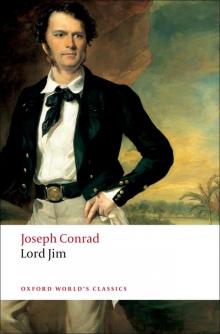 Lord Jim
Lord Jim The Nigger of the Narcissus (Echo Library)
The Nigger of the Narcissus (Echo Library) Victory (Dover Thrift Editions)
Victory (Dover Thrift Editions) Secret Agent
Secret Agent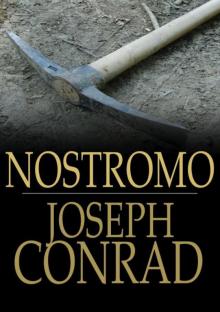 Nostromo
Nostromo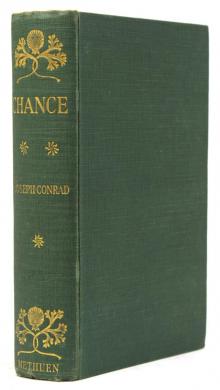 Chance: A Tale in Two Parts
Chance: A Tale in Two Parts Youth
Youth Almayer's Folly
Almayer's Folly The Heart of Darkness and the Secret Sharer
The Heart of Darkness and the Secret Sharer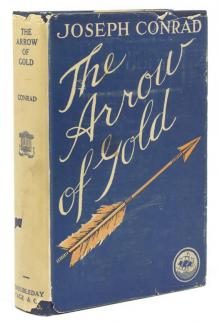 The Arrow of Gold: A Story Between Two Notes
The Arrow of Gold: A Story Between Two Notes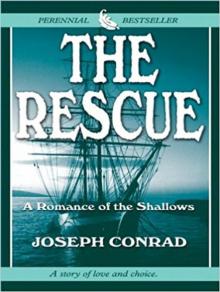 The Rescue: A Romance of the Shallows
The Rescue: A Romance of the Shallows The Point Of Honor: A Military Tale
The Point Of Honor: A Military Tale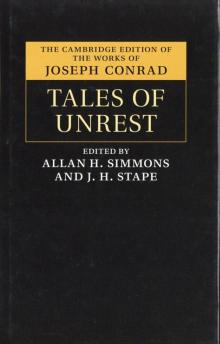 Tales of Unrest
Tales of Unrest Under Western Eyes
Under Western Eyes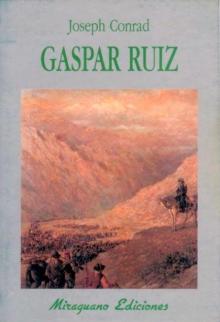 Gaspar Ruiz
Gaspar Ruiz A Set of Six
A Set of Six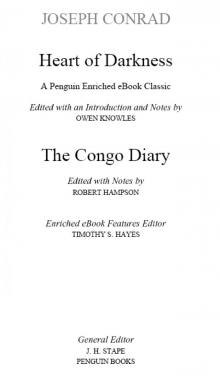 Heart of Darkness and the Congo Diary (Penguin Classics)
Heart of Darkness and the Congo Diary (Penguin Classics) Heart of Darkness and Selected Short Fiction
Heart of Darkness and Selected Short Fiction Typhoon
Typhoon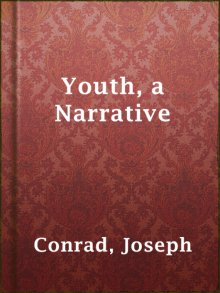 Youth, a Narrative
Youth, a Narrative Tomorrow
Tomorrow The Arrow of Gold
The Arrow of Gold The Shadow Line: A Confession
The Shadow Line: A Confession The Rescue
The Rescue Victory (Echo Library)
Victory (Echo Library) The Brute
The Brute Romance
Romance A Personal Record
A Personal Record Lord Jim: A Tale
Lord Jim: A Tale Heart of Darkness and Selected Short Fiction (Barnes & Noble Classics Series)
Heart of Darkness and Selected Short Fiction (Barnes & Noble Classics Series) Within the Tides
Within the Tides The Secret Sharer and Other Stories
The Secret Sharer and Other Stories Falk
Falk Heart of Darkness and The Secret Sharer
Heart of Darkness and The Secret Sharer Chance
Chance An Anarchist
An Anarchist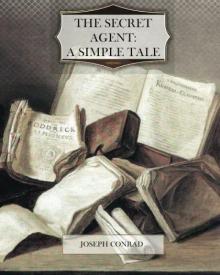 The Secret Agent: A Simple Tale
The Secret Agent: A Simple Tale The Secret Agent
The Secret Agent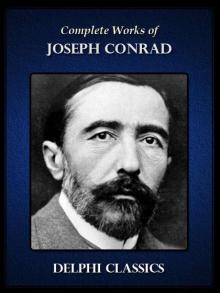 Complete Works of Joseph Conrad (Illustrated)
Complete Works of Joseph Conrad (Illustrated)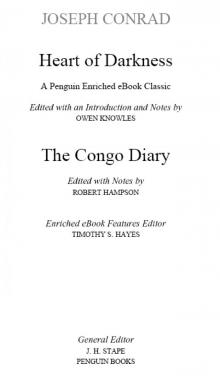 Heart of Darkness and the Congo Diary
Heart of Darkness and the Congo Diary Notes on Life & Letters
Notes on Life & Letters Typhoon (Single Story)
Typhoon (Single Story)